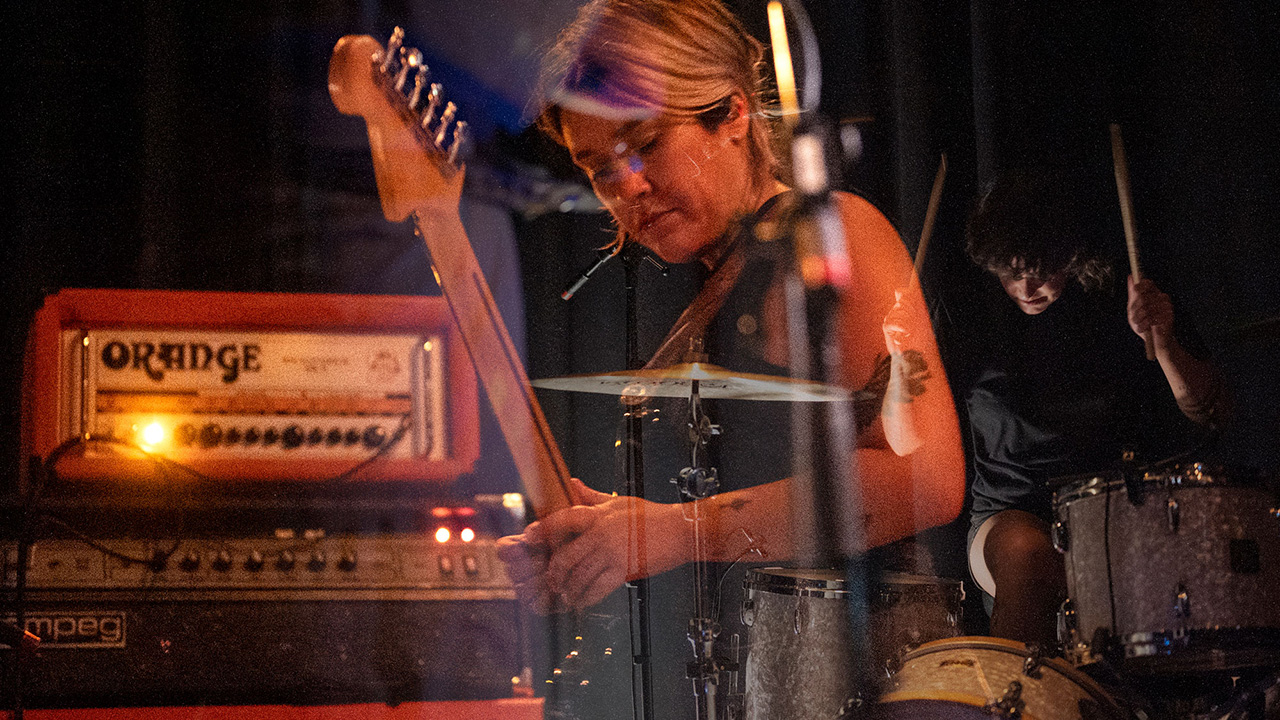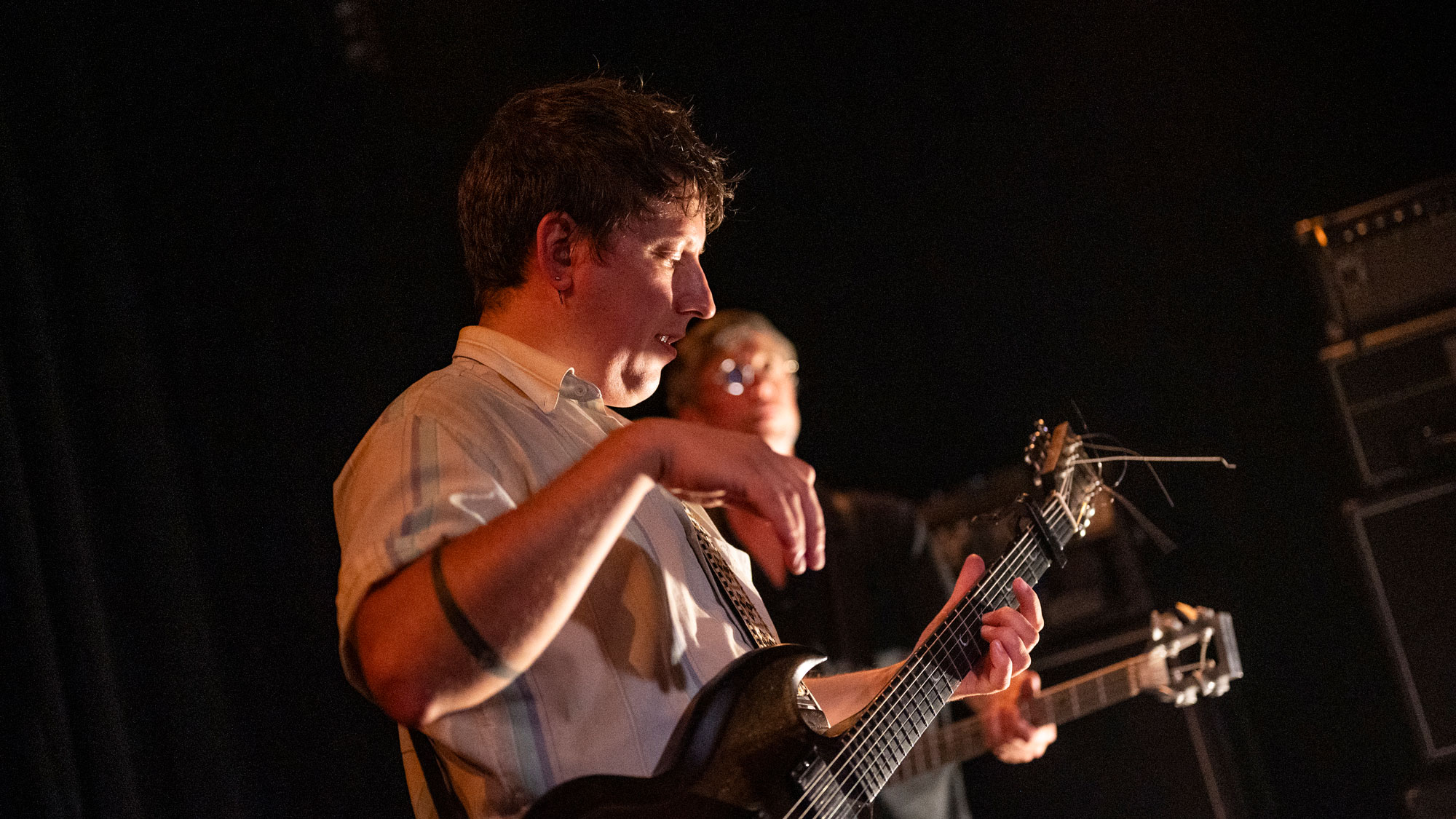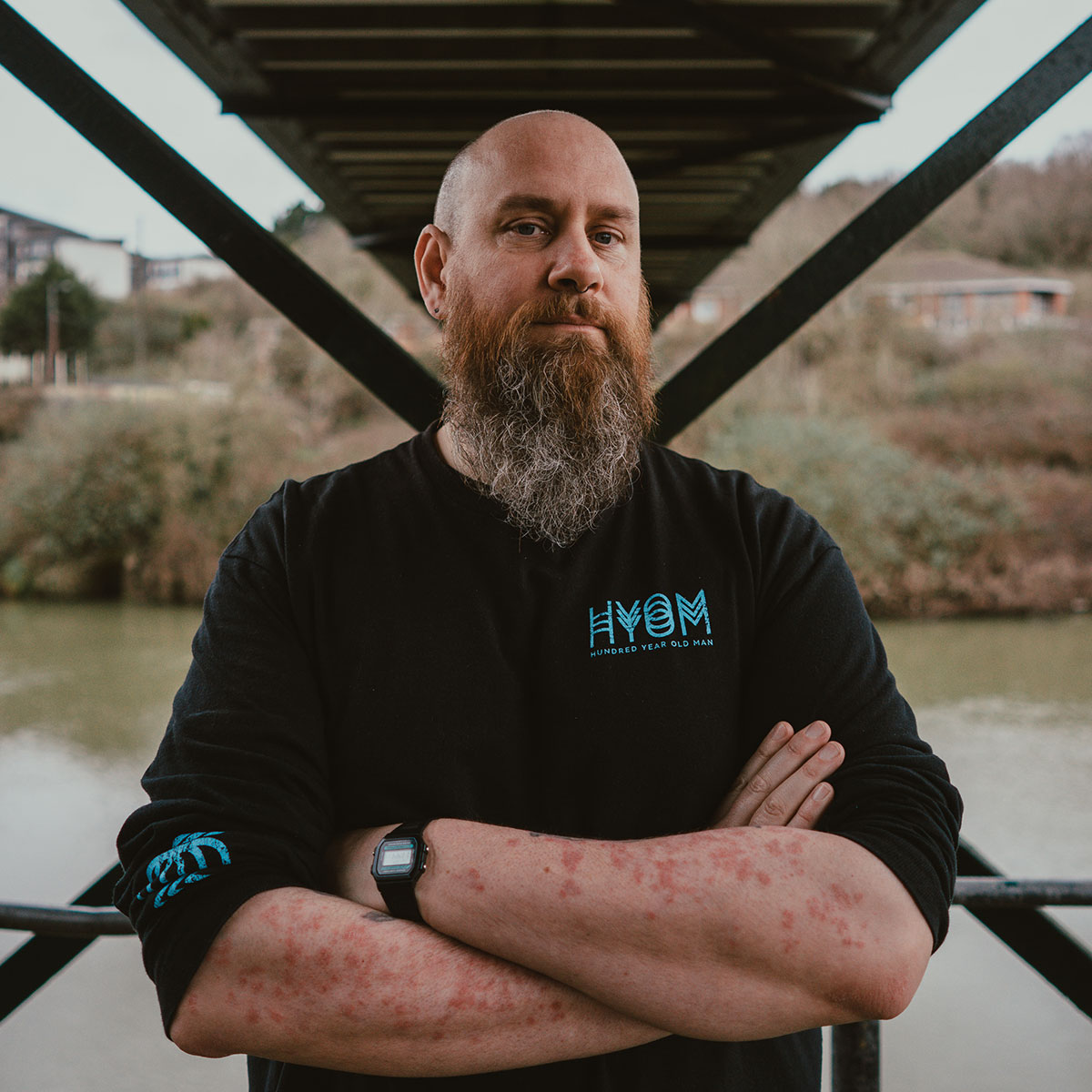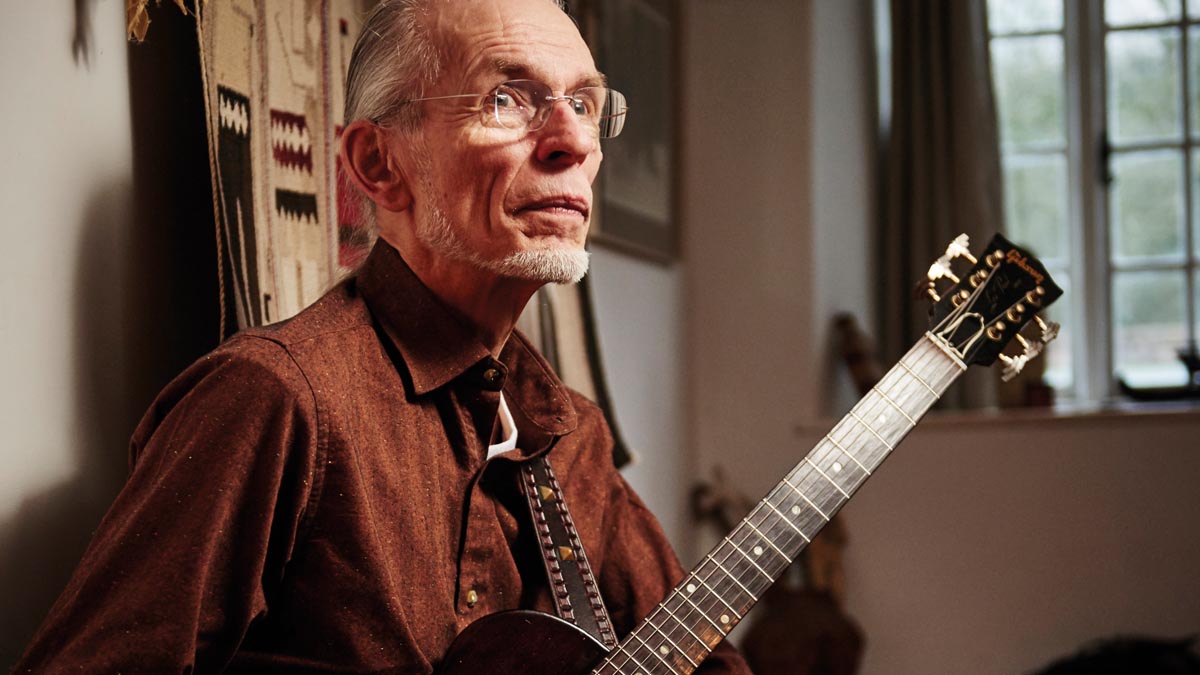“Unlearning our instruments is definitely something we’ve done – we don’t rely on fretboard technique”: BIG|BRAVE conjure some of today’s most thrilling guitar tones with feedback, open tunings and an awful lot of volume
A Chaos of Flowers finds the Canadian trio broadening their otherworldly sound as they look forward to “dismantling the little boys’ club” of heavy music. But try as they might, they can’t turn down the volume – this is vital guitar music made to be performed loud

All the latest guitar news, interviews, lessons, reviews, deals and more, direct to your inbox!
You are now subscribed
Your newsletter sign-up was successful
BIG|BRAVE’s 2023 album Nature Morte was a crushing distillation of their “massive minimalism,” built on Mathieu Ball’s guitar drone, textural distortion and feedback, singer/guitarist Robin Wattie’s powerful yet plaintive vocals, and Tasy Hudson’s glacial, pounding drums.
After a decade together and five albums with producer (and de facto fourth member) Seth Manchester, the band needed a change.
“When we were recording the last album, we all knew we had kind of exhausted the idea of the heavy band playing one chord with very repetitive songs,” Ball says. “Even while we were starting we said, ‘The next one will be a quiet record.’”
The band were listening to a lot of folk music in the run up to new release A Chaos of Flowers. Ball admits: “A few of the melodies and songs were really ripped off some dulcimer records I was listening to. They just spoke to me so much, I wanted to do that in the deconstructed guitar playing I do now.”
He cites Jean Ritchie – an Appalachian folk singer and dulcimer player from the 1950s – Gillian Welch, and jazz pianist Alice Coltrane; the latter to remind them of the importance of “improvisation and spatial playing, which we really wanted to include in these songs.”
Wattie embraced ‘90s R’n’B, folk, and soul from the ‘50s and ‘60s. “I was able to draw on these influences a lot more than on the previous records because I’m singing to chord changes, versus trying to find an interesting melody that can grab attention over one chord, which was a big challenge. But for A Chaos of Flowers, I was able to really let it out – just really go for it.”
The band’s collaborative approach is typified by the metallic drone on album opener I Felt a Funeral (inspired by minimalist composer Ellen Fullman). Ball explains the effect was achieved by Manchester reaching into a grand piano and jamming an EBow inside.
All the latest guitar news, interviews, lessons, reviews, deals and more, direct to your inbox!
“There’s a trust and a joy we have in working together now,” he adds. “Initially there was an engineer-band relationship, but now Seth does so much on the records, playing instruments, and no one gives him a hard time. It’s like, ‘If you have an idea, go for it!’”
Guest appearances from experimental guitarists Tashi Dorji and Marisa Anderson came about after health issues forced a gap of several months between two recording periods. “We used that to our advantage and found people who we like musically,” Ball says.
“We didn’t really think about their instruments – they were just people we were fans of and respected. We picked some songs but gave them no guidelines. We just trusted them. The tracks could have come back and we could have been unhappy, but all their contributions really elevated those songs.”
The result is a dense, multi-layered sound that generates heaviness from melodic movement and dynamics, rather than the feedback-drenched barrage of previous albums. BIG|BRAVE are excited to play the songs live – but the absence of the guests, and the amount of DI guitar recorded by Wattie, have created some challenges.
We’ve always tried to keep things as basic as possible… I almost thought it was ‘cheating’ to add more
Mathieu Ball
“There are nice piano and bass synths that are crucial to the songs, so we’ve loaded some sounds into an SPD sampler pad that Tasy will be triggering,” Ball says. “I’ll have a looper with some simple loops on there to fill out the sound.
“We’ve always tried to keep things as basic as possible with two guitars and drums, and I think I almost thought it was ‘cheating’ to add more. But the songs need it.”
There’s also the issue of controlling feedback and volume. “Feedback isn’t as important and predominant as on previous records,” Wattie says. “But once we start playing live, the songs will end up shifting and changing slightly. We’ll only know what sounds better or worse then.” She adds: “But we didn’t abandon feedback on this album – we just turned a corner.”
“I’m still using quite a bit of feedback,” Ball reports. “But what’s tricky is that we’re trying to play a touch quieter. Doing controlled feedback at lower volumes has been a challenge. But it may end up louder anyway.
“Despite our plan to have fewer amps on this tour, it’s just not happening. We have the same rental order as our last tour – nothing has changed despite our best efforts!”
Beyond the gear, the band’s approach to playing has been the focus of their attention, too. “Unlearning our instruments is definitely something we’ve done,” Ball says. “Do not rely on fretboard technique – make it all texture-based and keep things as simple as possible.

“But we’ve become okay with reintroducing melody and things like that. We were itching for some color in the music, and we’ve found a way to do it that doesn’t sound like a cop-out.”
“Or cheesy,” Wattie adds.
“Yeah – it’s okay to write a song!” Ball replies.
It’s not just loud heavy guitar music that gets noise complaints; it’s any show that is louder than an acoustic guitar and a singer
Robin Wattie
Wattie plays her black Fender Jaguar Special Edition through an Orange Rocker 30, an Ampeg SVT and an 8x10, with the bass amp dialed to 10 on the bass and 0 on the treble so that it pumps out nothing but low-end. The band get extra power on tour from Liam Andrews of My Disco, who plays an aluminium bass.
Their tunings have evolved with each album, but for A Chaos of Flowers, the pair both play in open B (B-F#-B-F#-B-B). Ball jokes that they used to use more intricate tunings, but the direction of travel means the next album could well be in “ostrich tuning” – the term coined by Lou Reed for all six strings tuned to the same note.
A carpenter by day, Ball built his main guitar, a natural finish SG, and plays through a Hiwatt Custom 50 and a Music Man RD100. He recently fitted brighter humbuckers, inspired by the sounds on his just-released second solo album, Amplified Guitar II. For that he used another SG he built, with an aluminum neck from Scott Hughes at Obscura and P-90s from the Electrical Guitar Company.
Ball explains: “It helped me hear the guitar in different ways, after so many years of chunky SGs. Having that brightness changed how I play the guitar – and now going back to the other SG, I enjoy playing ‘real’ guitar again.”
Despite their continued success, the band take nothing for granted while music venues globally are threatened by rocketing rents and energy prices, gentrification and noise complaints.
During 2023, 125 UK venues abandoned live music; while the iconic New York venue Saint Vitus – where BIG|BRAVE have played multiple times – has been shuttered since February. Noise complaints have shut down multiple locations in the band’s hometown of Montreal, too.
“A venue we were meant to play at, Turbo Haüs, had gotten a noise complaint,” Ball explains. “I chatted to the owner a week before the show about what to do, and he said ‘I don’t care!’ Then we played the loudest show they’d ever had.
“It was a risk he was taking, as noise complaints come with hefty fines sometimes, but this is what is happening to music venues all over the world.”
Wattie adds: “It’s not just loud heavy guitar music that gets noise complaints; it’s any show that is louder than an acoustic guitar and a singer.” But she insists it’s not just the responsibility of musicians, bands and their scenes to solve these structural issues.
“It’s down to anyone who wants to see and experience live music. They need to do the work of contacting legislators and taking political action. It has to come from the people with the power.
You can’t have a big festival and just have the dude bands. It looks bad, and it’s boring
Mathieu Ball
“And Montreal needs to stop building condos in the areas where venues are. People with money come in and say, ‘Oh, I’m in the thick of it!’ But then they complain about noise because, ‘It’s after 11 and I want to go bed; I have a job.’ Oh my God – it’s so classist!”
Ball argues: “I can see cities becoming cultural wastelands. It’s heartbreaking to go back to a city you’ve played and you hear the place has shut down. There has to be more protection for nightlife, because it’s as important as anything else in the fabric of a city.”
Despite all that, BIG|BRAVE are positive about the increasing diversity of heavy guitar music. Wattie has spoken candidly in the past about the challenges of being a mixed-race woman on the scene, but she’s hopeful about the future.
“Things have definitely changed compared to 10-12 years ago – even five years ago. I think the pandemic jumpstarted everyone who was interested in playing to start doing it.”
“Everyone is making efforts,” Ball says. “You can’t have a big festival and just have the dude bands. It looks bad, and it’s boring. This little boys’ club of heavy music – in fact, all music – is being dismantled at a much faster rate than ever before.
“It’s not perfect, but you see it at festivals: it’s going in the right direction.”
- A Chaos of Flowers is out now via Thrill Jockey.
Dan discovered guitar in his early teens – playing every day on a sunburst Les Paul copy he still regrets selling – and has never stopped. He studied English at Cambridge then spent several years working in Japan, addicted to karaoke and manga. His fiction, music journalism, essays and translations from Japanese have appeared in Granta, The Guardian and The Quietus, among others. He plays a battered but cherished Thunderbird in progressive sludge-metal band URZAH.




